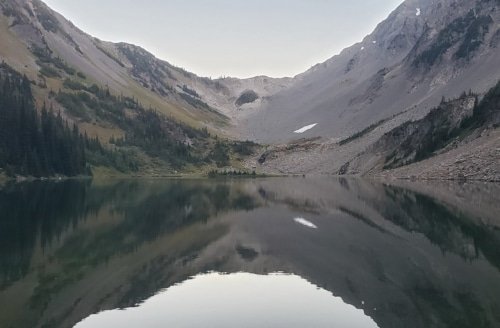

This is part eight of my ongoing series about the Story of the Bible (SotB). You may or may not agree with what I say here. And that is OK; I make no claims to infallibility. But I do hope that it will stimulate some thought about the topic.
So far, the posts have looked at creation, the fall, God’s promise to Abraham, his covenant with Israel, and the consequences of a broken covenant. This post will briefly examine the hope the prophets held out for Israel’s future after exile.
A Quick Review
God established a covenant with Israel. If Israel would obey the terms of the covenant, they would be God’s special possession, a holy nation. But Israel failed to keep the covenant terms. Not just occasionally, but nearly continuously.
God would have been justified in abandoning them entirely. But he did not. He was faithful to his end of the covenant for several centuries. But eventually, the nation was destroyed and carried into exile. Was this the end?
Hope for the Future
Surprisingly enough, it was not the end for Israel. Amid their message of doom for the nation, Isaiah, Jeremiah, and Ezekiel held out a ray of hope. Exile was coming. But it was not the end. The prophets revealed that God would restore them as a nation. And even more surprising, they would reach heights exceeding anything they had previously known.
A Restored Kingdom
As a part of God’s covenant with Abraham, he promised to give to his descendants after him the land of Canaan for an everlasting possession (Gen. 17:8). And he reaffirmed that promise to Jacob (Gen. 48:4). This promise of land was reaffirmed as Israel prepared to enter Canaan. However, the promise was provisional on their keeping the covenant (Deut. 11:22-24).
Israel failed to live up to their end of the covenant. But God remained faithful to his promise, and they did take the land. It was a slow process, but under David and Solomon, they reached their greatest extent and power as a nation.
But eventually, God allowed the divided nations of Israel and Judah to be conquered and led away into exile. But for those living in exile, there was a ray of hope from the prophets.
For behold, days are coming, declares the LORD, when I will restore the fortunes of my people, Israel and Judah, says the LORD, and I will bring them back to the land that I gave to their fathers, and they shall take possession of it.”
This would have given a people living in exile far from their home some hope. There was a light at the end of the tunnel. They did return under the Persians. But apart from a brief period under the Maccabees, they were never again an independent nation. At least not until recent times.
A King from the Line of David
God had established a covenant with David that he would always have a descendant sitting on the throne of Israel (2 Sam. 7:16). At least as long as his line was faithful (1 Ki. 8:25). But they were, by and large, unfaithful to God. And the reign of kings from the line of David ended with the Babylonian conquest.
“Behold, the days are coming, declares the LORD, when I will raise up for David a righteous Branch, and he shall reign as king and deal wisely, and shall execute justice and righteousness in the land. In his days Judah will be saved, and Israel will dwell securely. And this is the name by which he will be called: ‘The LORD is our righteousness.’
Yet, looking ahead, Jeremiah saw a time when a king from the line of David would again sit on the throne, ruling wisely and justly. And this one from the line of David would reign forever (Ezk 37:24-28). And his kingdom would never end (Dan. 2:44).
A Renewed Temple and Priesthood
During the year that Israel stayed at Sinai, God gave instructions for building the Tabernacle, a portable worship center for Israel. It essentially represented God’s presence among the people. And he set apart one tribe, Levi, to care for the Tabernacle and one family, Aaron’s, to serve as priests.
During the reign of Solomon, a permanent structure was built to replace the Tabernacle. Solomon’s temple was a magnificent structure. And God told Solomon his name would be there forever (1 Ki. 9:3, 2 Ch. 7:16). The expectation was that this temple would last forever.
But it did not last forever. When the Babylonians destroyed Jerusalem, they destroyed the temple as well. Israel built a new temple when they returned from exile, and Herod extensively remodeled and expanded it. But it, too, was destroyed by the Romans when the Jews rebelled against Rome.
However, Ezekiel 40-48 describes a new temple, the people who serve in it, the city that houses it, and the surrounding land. A temple that is much grander than anything that preceded it.
But Not Yet
Israel entered into a covenant relationship with God but immediately broke it and continued to break it until God finally sent them into exile. Yet God spoke through the prophets, telling them that God had plans for them despite their rebellion. That the promise of land, king, and temple still remained. Even after it had all been lost.
So what do we make of that? Did God’s promises fail? Did Israel’s failure lead God to abandon them? Or were/are God’s promises to them still awaiting a future fulfillment?
Coming Up
God has a plan for his creation. A plan that was in place before creation began. That means that Israel had a place in God’s plan. And not just any place. But, seemly, a central role.
Israel’s failure to keep their covenant obligations, their exile, and the promises God made to them of a restoration all fit into God’s eternal plan. They are necessary steps in the unfolding of that plan. Steps that he builds on from there.
The next post in this series will look at a surprising twist in the story. A twist that will start to make sense of all that came before.
- The Story of the Bible (2/8/2025) – This is an introductory post to a series on the story of the Bible. At least as I understand it. Each post will build on the previous posts.
- A Good Creation (2/15/2025) – God created a good, although not necessarily perfect, world. His creation included all that has been made, both physical and spiritual.
- Humanity (2/22/2025) – Humanity is described as the final work in God’s creation, created to be in God’s image, and given rule over the rest of the creation.
- The Fall and Death (3/1/2025) – How did God’s creation end up in the mess it’s in. Genesis tells us humanity rebelled against God, fell from our high place, and faced death.
- An Unconditional Promise (3/8/2025) – Abraham was promised land, descendants as numerous as the dust of the earth, and offspring who would be a blessing to all people.
- A Conditional Covenant (3/15/2025) – At Mt. Sinai, God entered into a conditional covenant relationship with Israel. They would be his people if they obeyed the covenant terms.
- Breaking the Covenant (3/22/2025) – Israel repeatedly broke their covenant with God and eventually faced exile. Was that the end? Or was there still hope for them?
- Holding Out Hope (3/29/2025) – The prophets held out hope, telling Israel God had plans for them despite their rebellion. The promise of land, king, and temple remained.
The post Holding Out Hope appeared first on A Clay Jar.


